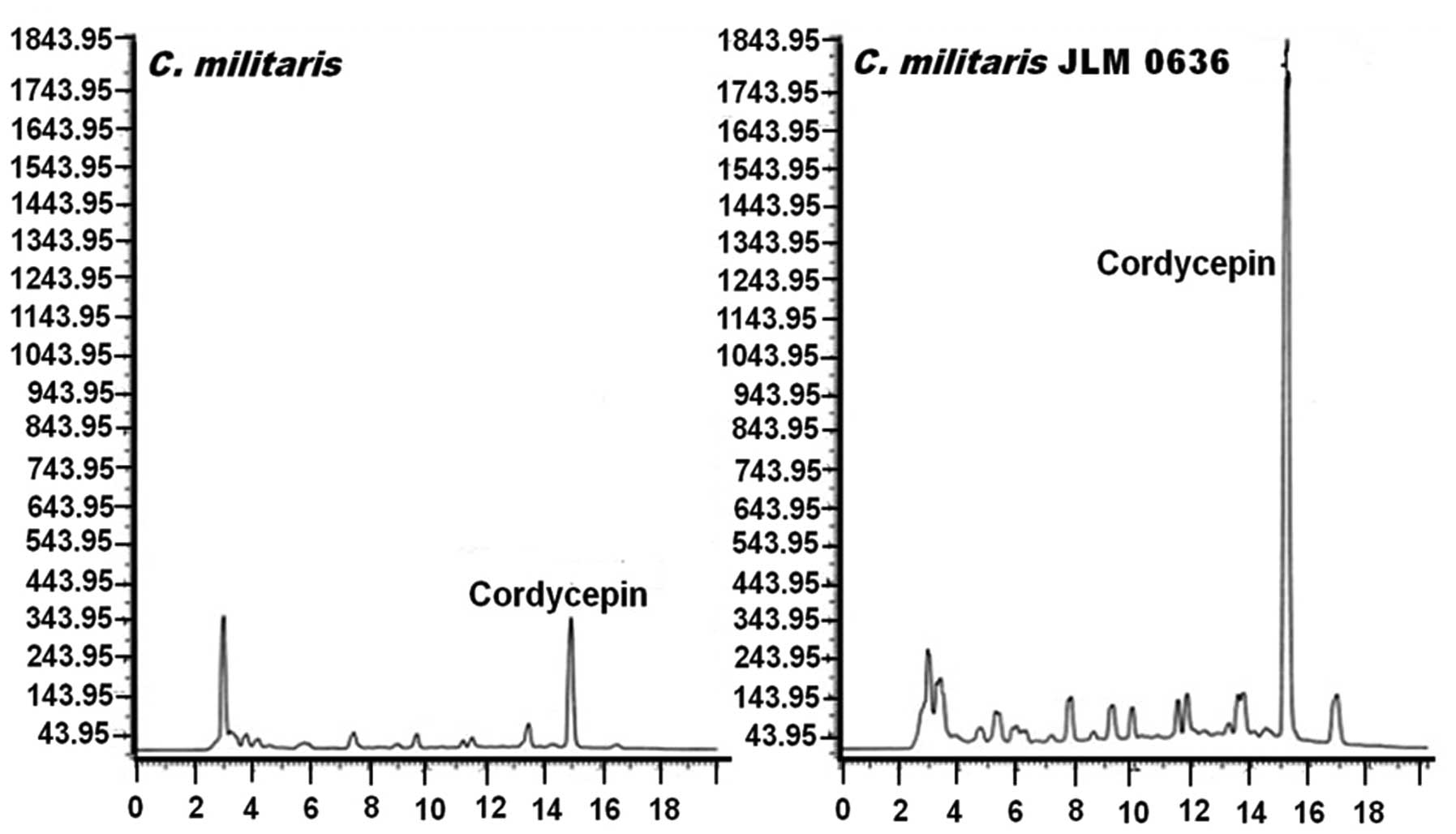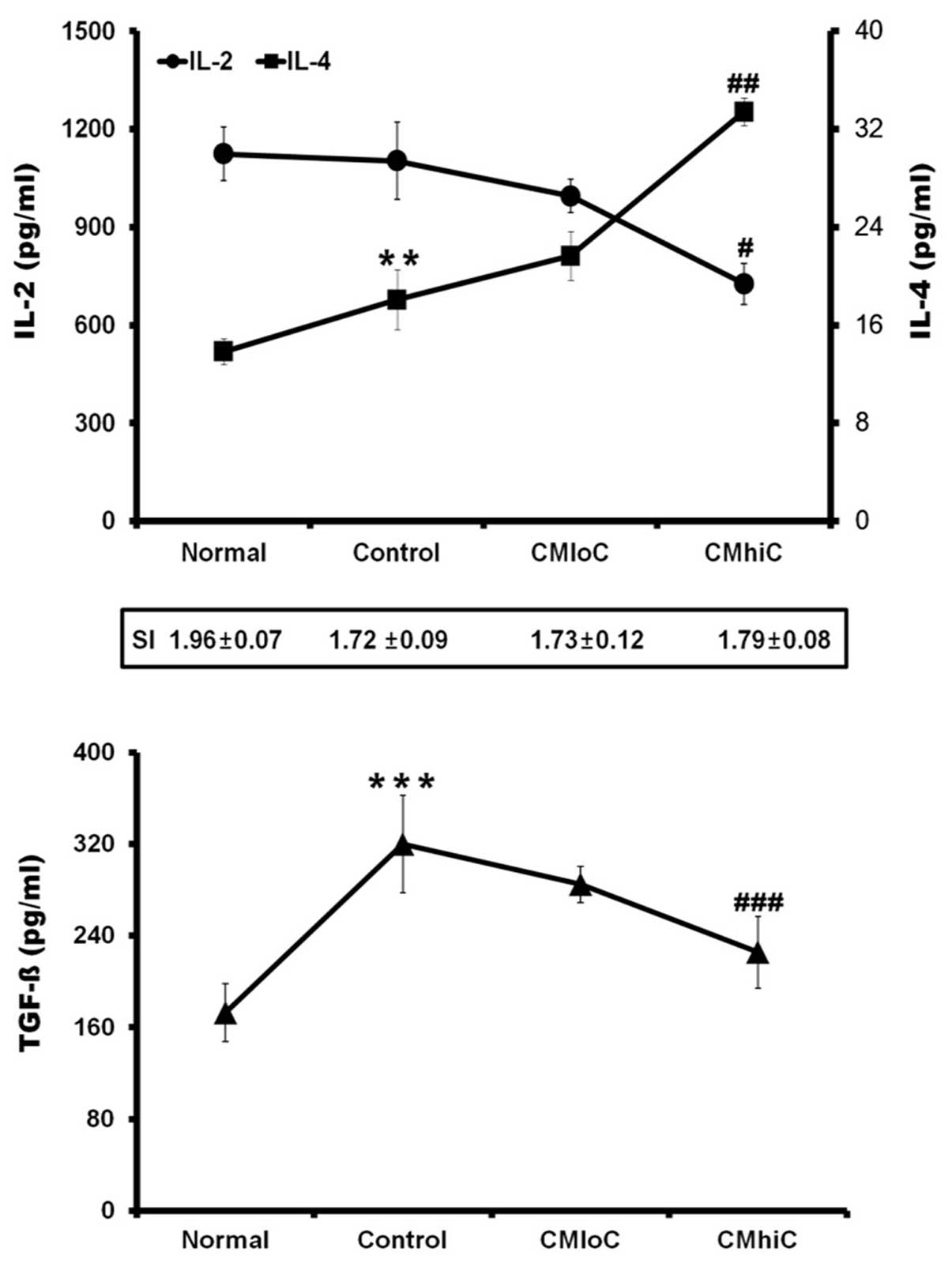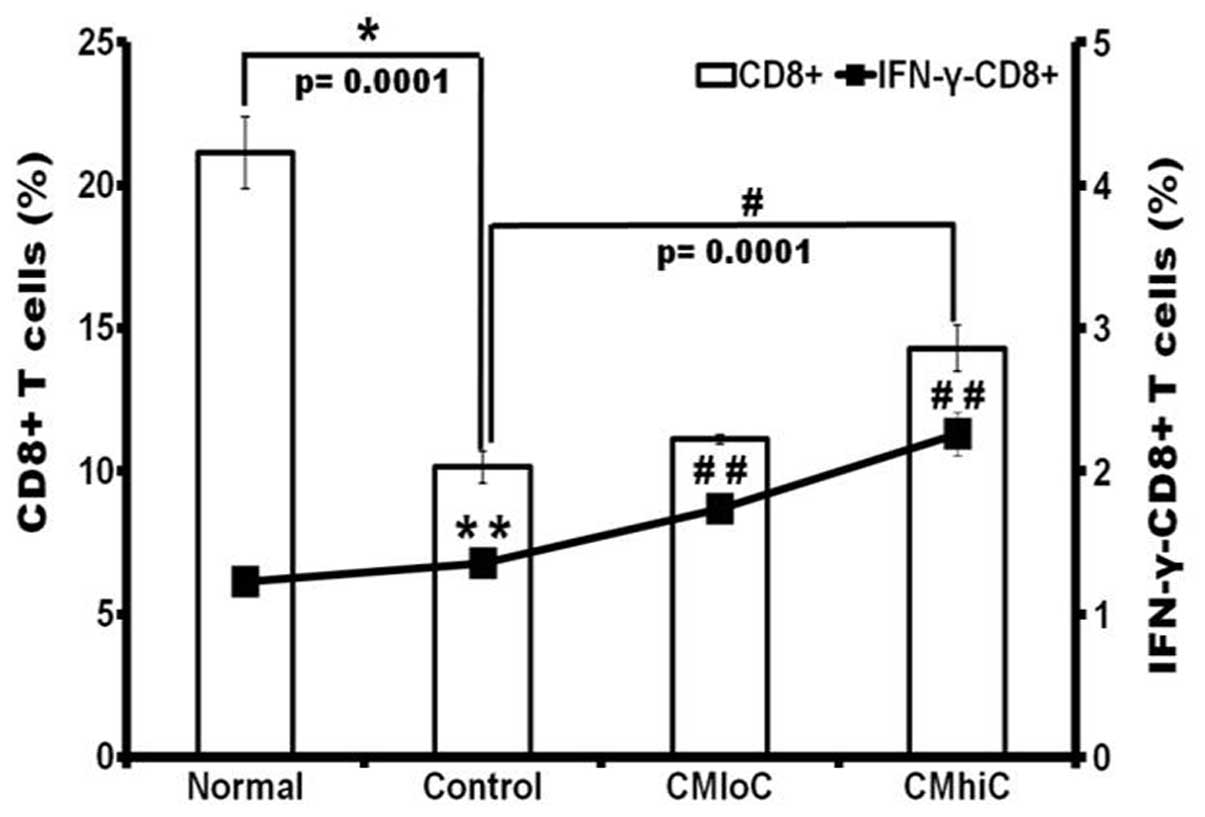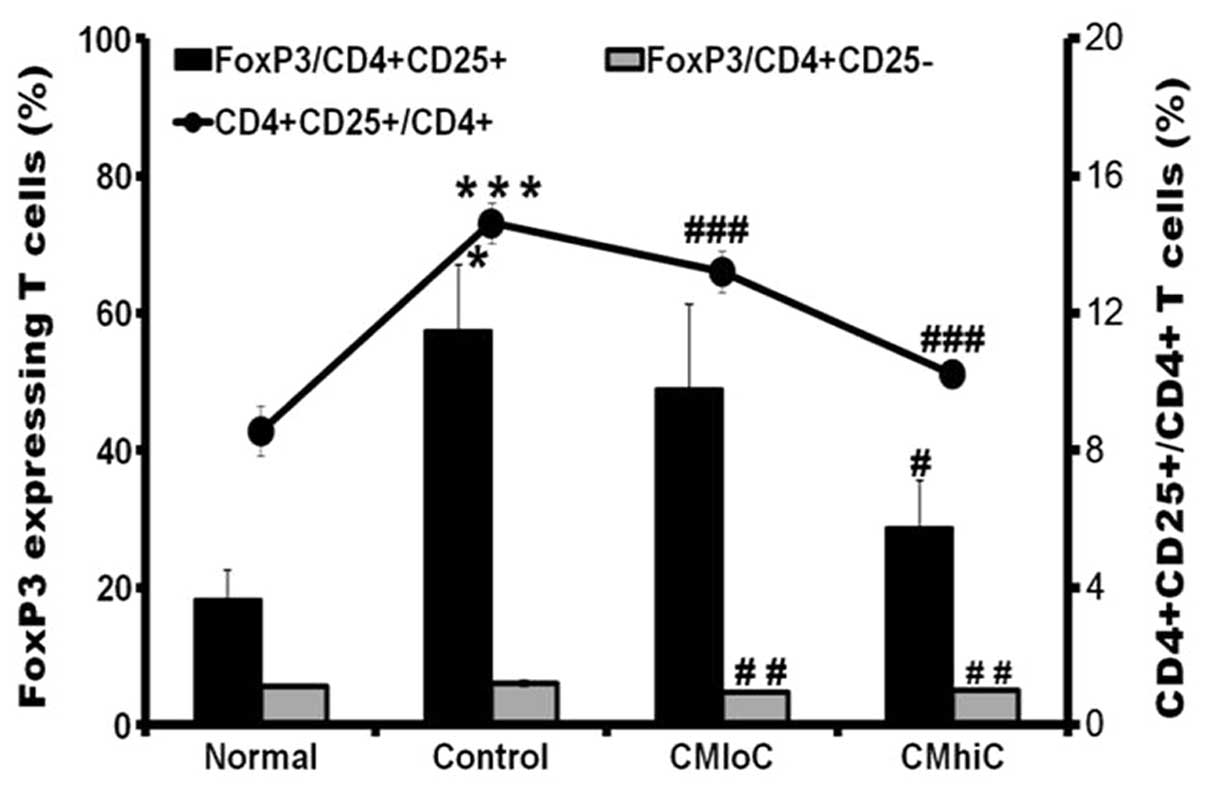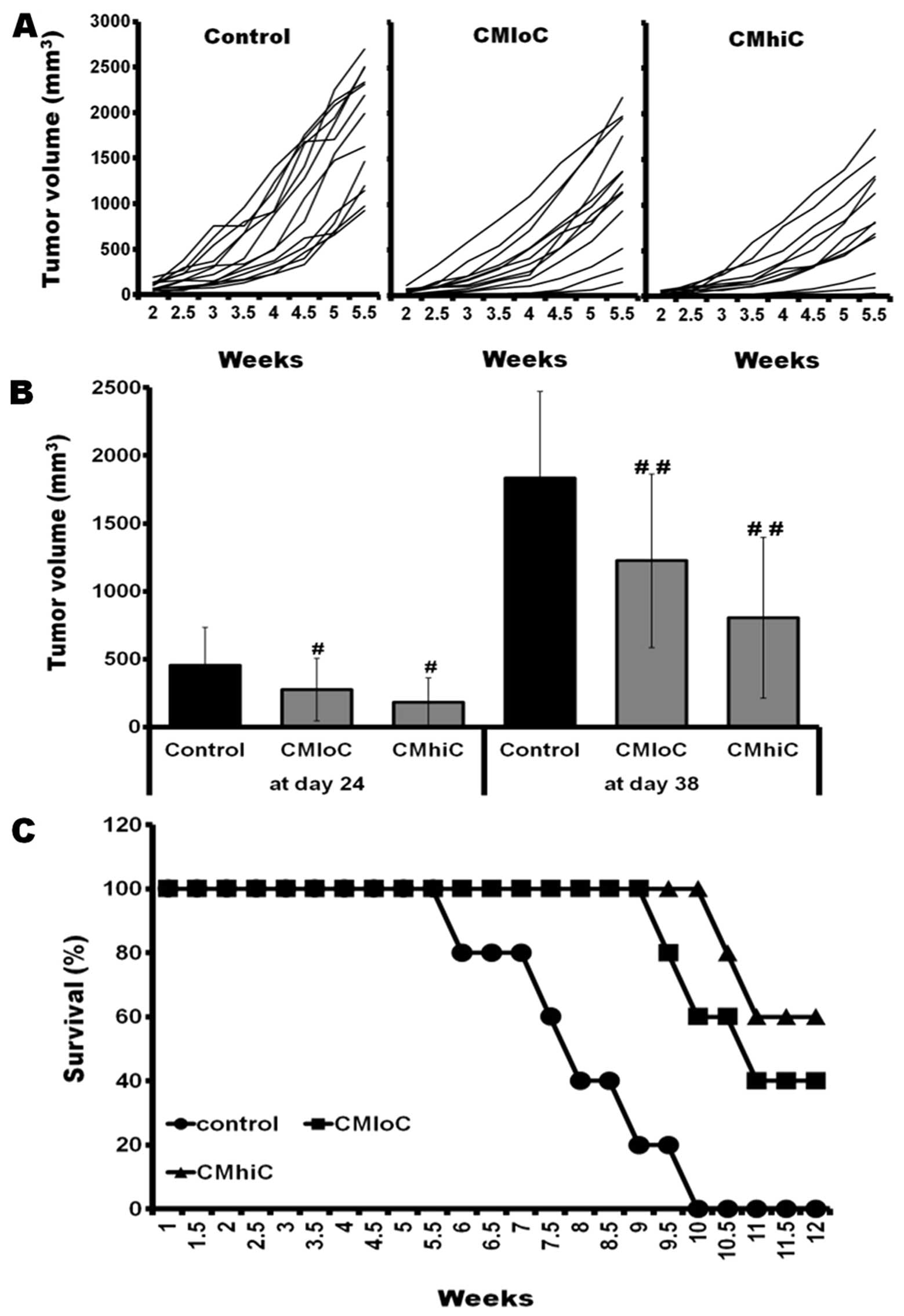|
1
|
Cunningham KG, Manson W, Spring FS and
Hutchinson SA: Cordycepin, a metabolic product isolated from
cultures of Cordyceps militaris (Linn.). Nature.
166:9491950. View
Article : Google Scholar : PubMed/NCBI
|
|
2
|
Paterson RR: Cordyceps: a traditional
Chinese medicine and another fungal therapeutic biofactory?
Phytochemistry. 69:1469–1495. 2008. View Article : Google Scholar : PubMed/NCBI
|
|
3
|
Kim HG, Shrestha B, Lim SY, et al:
Cordycepin inhibits lipopolysaccharide-induced inflammation by the
suppression of NF-κB through Akt and p38 inhibition in RAW 264.7
macrophage cells. Eur J Pharmacol. 545:192–199. 2006.PubMed/NCBI
|
|
4
|
Yun Y, Han S, Lee S, Ko S, Lee C, Ha N and
Kim K: Anti-diabetic effects of CCCA, CMESS, and cordycepin from
Cordyceps militaris and the immune responses in
streptozotocin-induced diabetic mice. Nat Prod Sci. 9:291–298.
2003.
|
|
5
|
Ahn YJ, Park SJ, Lee SG, Shin SC and Choi
DH: Cordycepin: selective growth inhibitor derived from liquid
culture of Cordyceps militaris against Clostridium
spp. J Agric Food Chem. 48:2744–2748. 2000. View Article : Google Scholar : PubMed/NCBI
|
|
6
|
Sugar AM and McCaffrey RP: Antifungal
activity of 3′-deoxyadenosine (cordycepin). Antimicrob Agents
Chemother. 42:1424–1427. 1998.
|
|
7
|
Müller WE, Weiler BE, Charubala R, et al:
Cordycepin analogues of 2′,5′-oligoadenylate inhibit human
immunodeficiency virus infection via inhibition of reverse
transcriptase. Biochemistry. 30:2027–2033. 1991.
|
|
8
|
Kodama EN, McCaffrey RP, Yusa K and
Mitsuya H: Antileukemic activity and mechanism of action of
cordycepin against terminal deoxynucleotidyl transferase-positive
(TdT+) leukemic cells. Biochem Pharmacol. 59:273–281.
2000. View Article : Google Scholar : PubMed/NCBI
|
|
9
|
Cho MA, Lee DS, Kim MJ, Sung JM and Ham
SS: Antimutagenicity and cytotoxicity of cordycepin isolated from
Cordyceps militaris. Food Sci Biotechnol. 12:472–475.
2003.
|
|
10
|
Nakamura K, Konoha K, Yoshikawa N,
Yamaguch Y, Kagota S, Shinozuka K and Kunitomo M: Effect of
cordycepin (3′-deoxyadenosine) on hematogenic lung metastatic model
mice. In Vivo. 19:137–141. 2005.
|
|
11
|
Nakamura K, Yoshikawa N, Yamaguchi Y,
Kagota S, Shinozuka K and Kunitomo M: Antitumor effect of
cordycepin (3′-deoxyadenosine) on mouse melanoma and lung carcinoma
cells involves adenosine A3 receptor stimulation. Anticancer Res.
26:43–48. 2006.
|
|
12
|
Thomadaki H, Scorilas A, Tsiapalis CM and
Havredaki M: The role of cordycepin in cancer treatment via
induction or inhibition of apoptosis: implication of
polyadenylation in a cell type specific manner. Cancer Chemother
Pharmacol. 61:251–265. 2008. View Article : Google Scholar : PubMed/NCBI
|
|
13
|
Jeong JW, Jin CY, Park C, et al: Induction
of apoptosis by cordycepin via reactive oxygen species generation
in human leukemia cells. Toxicol In Vitro. 25:817–824. 2011.
View Article : Google Scholar : PubMed/NCBI
|
|
14
|
Odunsi K and Old LJ: Tumor infiltrating
lymphocytes: indicators of tumor-related immune responses. Cancer
Immun. 7:32007.PubMed/NCBI
|
|
15
|
Zou W: Immunosuppressive networks in the
tumour environment and their therapeutic relevance. Nat Rev Cancer.
5:263–274. 2005. View Article : Google Scholar : PubMed/NCBI
|
|
16
|
Jeong MH, Seo MJ, Park JU, et al: Effect
of cordycepin purified from Cordyceps militaris on Th1 and
Th2 cytokines in mouse splenocytes. J Microbiol Biotechnol.
22:1161–1164. 2012.PubMed/NCBI
|
|
17
|
Zou W: Regulatory T cells, tumour immunity
and immunotherapy. Nat Rev Immunol. 6:295–307. 2006. View Article : Google Scholar : PubMed/NCBI
|
|
18
|
Curiel TJ: Regulatory T cells and
treatment of cancer. Curr Opin Immunol. 20:241–246. 2008.
View Article : Google Scholar
|
|
19
|
Liu Z, Kim JH, Falo LDJ and You Z: Tumor
regulatory T cells potently abrogate antitumor immunity. J Immunol.
182:6160–6167. 2009. View Article : Google Scholar : PubMed/NCBI
|
|
20
|
Malmberg KJ: Effective immunotherapy
against cancer: a question of overcoming immune suppression and
immune escape? Cancer Immunol Immunother. 53:879–892. 2004.
View Article : Google Scholar : PubMed/NCBI
|
|
21
|
Horowitz B, Goldfinger BA and Marmur J:
Effect of cordycepin triphosphate on the nuclear DNA-dependent RNA
polymerases and poly(A) polymerase from the yeast, Saccharomyces
cerevisiae. Arch Biochem Biophys. 172:143–148. 1976. View Article : Google Scholar : PubMed/NCBI
|
|
22
|
Muller WE, Seibert G, Beyer R, Breter HJ,
Maidhof A and Zahn RK: Effect of cordycepin on nucleic acid
metabolism in L5178Y cells and on nucleic acid-synthesizing enzyme
systems. Cancer Res. 37:3824–3833. 1977.PubMed/NCBI
|
|
23
|
Rosenberg SA: Karnofsky Memorial Lecture.
The immunotherapy and gene therapy of cancer. J Clin Oncol.
10:180–199. 1992.PubMed/NCBI
|
|
24
|
von Boehmer H: Mechanisms of suppression
by suppressor T cells. Nat Immunol. 6:338–344. 2005.PubMed/NCBI
|
|
25
|
Itoh M, Takahashi T, Sakaguchi N, Kuniyasu
Y, Shimizu J, Otsuka F and Sakaguchi S: Thymus and autoimmunity:
production of CD25+CD4+ naturally anergic and
suppressive T cells as a key function of the thymus in maintaining
immunologic self-tolerance. J Immunol. 162:5317–5326.
1999.PubMed/NCBI
|
|
26
|
Takahashi T, Kuniyasu Y, Toda M, et al:
Immunologic self-tolerance maintained by
CD25+CD4+ naturally anergic and suppressive T
cells: induction of autoimmune disease by breaking their
anergic/suppressive state. Int Immunol. 10:1969–1980. 1998.
|
|
27
|
de la Rosa M, Rutz S, Dorninger H and
Scheffold A: Interleukin-2 is essential for
CD25+CD4+ regulatory T cell function. Eur J
Immunol. 34:2480–2488. 2004.PubMed/NCBI
|
|
28
|
Furtado GC, Curotto de Lafaille MA,
Kutchukhidze N and Lafaille JJ: Interleukin 2 signaling is required
for CD4+ regulatory T cell function. J Exp Med.
196:851–857. 2002. View Article : Google Scholar : PubMed/NCBI
|
|
29
|
Yao Z, Kanno Y, Kerenyi M, et al:
Nonredundant roles for Stat5a/b in directly regulating
Foxp3. Blood. 109:4368–4375. 2007. View Article : Google Scholar : PubMed/NCBI
|
|
30
|
Yamagiwa S, Gray JD, Hashimoto S and
Horwitz DA: A role for TGF-β in the generation and expansion of
CD4+CD25+ regulatory T cells from human
peripheral blood. J Immunol. 166:7282–7289. 2001.
|
|
31
|
Ghiringhelli F, Puig PE, Roux S, et al:
Tumor cells convert immature myeloid dendritic cells into
TGF-β-secreting cells inducing CD4+CD25+
regulatory T cell proliferation. J Exp Med. 202:919–929.
2005.PubMed/NCBI
|
|
32
|
Chen W, Jin W, Hardegen N, et al:
Conversion of peripheral CD4+CD25− naive T
cells to CD4+CD25+ regulatory T cells by
TGF-β induction of transcription factor Foxp3. J Exp Med.
198:1875–1886. 2003.
|
|
33
|
Valérie D, Amit A, Hyoung K, et al: IL-4
inhibits TGF-β-induced Foxp3+ T cells and, together with
TGF-β, generates IL-9+ IL-10+
Foxp3−effector T cells. Nat Immunol. 9:1347–1355.
2008.
|
|
34
|
Xiaoyu H and Lionel BL: Cross-regulation
of signaling pathway by interferon-γ: implication for immune
response and autoimmune diseases. Immunity. 31:539–550. 2009.
|
|
35
|
Chen ML, Pittet MJ, Gorelik L, et al:
Regulatory T cells suppress tumor-specific CD8 T cell cytotoxicity
through TGF-β signals in vivo. Proc Natl Acad Sci.
102:419–424. 2005.PubMed/NCBI
|















